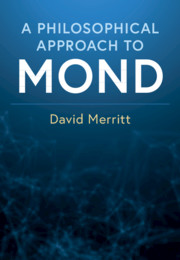Book contents
- Frontmatter
- Dedication
- Contents
- Preface
- 1 The Epistemology of Science
- 2 The Methodology of Scientific Research Programs
- 3 The Milgromian Research Program
- 4 Theory Variant T0: The Foundational Postulates
- 5 Theory Variant T1: A Non-relativistic Lagrangian
- 6 Theory Variant T2: A Relativistic Theory
- 7 Theory Variant T3: A Modified Hard Core
- 8 Convergence
- 9 Summary / Final Thoughts
- References
- Index
7 - Theory Variant T3: A Modified Hard Core
Published online by Cambridge University Press: 20 April 2020
- Frontmatter
- Dedication
- Contents
- Preface
- 1 The Epistemology of Science
- 2 The Methodology of Scientific Research Programs
- 3 The Milgromian Research Program
- 4 Theory Variant T0: The Foundational Postulates
- 5 Theory Variant T1: A Non-relativistic Lagrangian
- 6 Theory Variant T2: A Relativistic Theory
- 7 Theory Variant T3: A Modified Hard Core
- 8 Convergence
- 9 Summary / Final Thoughts
- References
- Index
Summary
The fourth variant of Milgrom’s theory (T3) is due to Justin Khoury and Lasha Berezhiani. These researchers made a change to Milgrom’s postulates in order to address the failings of theory variants T0–T2. They introduced dark matter into the theory, but postulated that, on scales corresponding to galaxies, the dark matter acts like a superfluid condensate. By adjusting the equation of state of the superfluid, they showed that the interaction of the dark matter with normal matter – via Newtonian gravity, but also via coupling of the superfluid phonons – can result in an acceleration that approximates Milgrom’s modified dynamics in the low-acceleration regime. On large scales, the dark matter would behave like the dark matter in the standard model. Although still in an early stage of development, Khoury and Berezhiani’s theory has not yet demonstrated an increase in testable content compared withT0–T2, and in fact much of the content of the earlier theory variants is lost.
Keywords
Information
- Type
- Chapter
- Information
- A Philosophical Approach to MONDAssessing the Milgromian Research Program in Cosmology, pp. 181 - 203Publisher: Cambridge University PressPrint publication year: 2020
